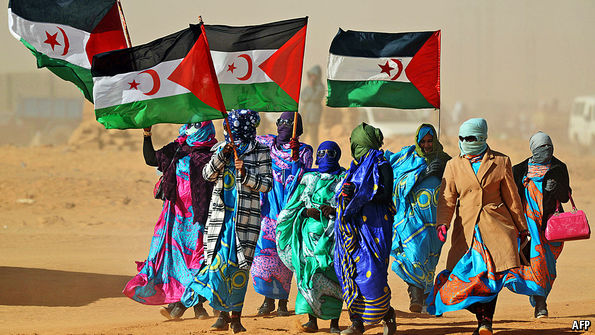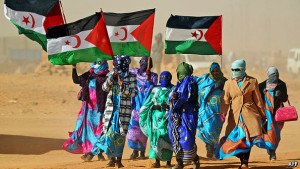The Economist
Back in the spotlight, the fate of Western Sahara is no closer to resolution.
ACCORDING to the map sold in the gift shop at the airport in Laayoune, the capital of Western Sahara, the territory belongs solely to Morocco. But the airport itself contains signs that this is contested land. Planes bearing the UN’s marking sit on the runway, while its soldiers, sporting blue berets, roam the arrivals hall. They are there to keep the peace between Morocco and the Polisario Front, a nationalist movement that has fought for independence for more than 40 years.
Fears are growing of a return to armed conflict. Provocations by Morocco have infuriated Polisario, which has responded in kind. Since last summer the UN has stood between the two enemies, just 120 metres apart, in the remote area of Guerguerat. Diplomats worry that an itchy trigger finger could restart the 16-year war that the UN helped end in 1991. “The threat to peace and security is probably the worst we have seen since then,” says a UN official.
Hostilities between Morocco and Polisario began shortly after Spain, the colonial power, withdrew from Western Sahara in 1975, when Morocco annexed the territory. A ceasefire agreement in 1991 promised a referendum on independence, but no vote was held. Morocco was thus left in control of two-thirds of the territory, including Laayoune, while Polisario runs the remaining part. They are separated by a 2,700km (1,700-mile) sand berm, built by the Moroccan army and sown with mines.
Morocco moved south of the berm last August, when it began paving a road in Guerguerat, ostensibly to combat smuggling (but probably also to facilitate trade). Its deployment of security forces with the construction crews was seen as a violation of the ceasefire agreement. In response, Polisario also began building new structures and positioning armed elements in the area. The secretary-general of Polisario, Brahim Ghali, paid a visit to the region in December, stoking the tension.
The standoff in Guerguerat is a symptom of much deeper problems. While Morocco’s portion of Western Sahara contains valuable phosphates, oil and fish stocks, the Polisario’s third provides little of value. Many Sahrawis continue to live in refugee camps in neighbouring Algeria, which supports the cause of Western Sahara. “Refugees born and raised in exile are beating the drums for war,” writes Hannah Armstrong, an analyst.
Many Sahrawis also believe that the UN will not stand up to Morocco. The kingdom expelled some 70 UN workers last spring after Ban Ki-moon, then the UN’s secretary general, described Morocco’s presence in Western Sahara as an “occupation”. (It has since let some, but not all, back in.) Morocco spends large sums of money lobbying governments, and threatens those that are unsupportive. It dressed down America’s ambassador last year over a report that criticised its human-rights record. And it has reacted angrily to rulings by European courts that dismissed its claim to Western Sahara.
Some hope that Morocco’s readmission to the African Union (AU) on January 31st will help to resolve the dispute. The kingdom left the AU’s predecessor, the Organisation of African Unity, in 1984 after a majority of the member states recognised Polisario and granted it membership as the Sahrawi Arab Democratic Republic (SADR). By returning, Morocco is supposed to accept the AU’s protocols, which state that members’ borders (including those of the SADR) are inviolable.
Others, though, believe Morocco will instead work from within the organisation to undermine the AU’s support for Polisario. Indeed, Nasser Bourita, Morocco’s deputy foreign minister, has said as much. “Not only does Morocco not recognise—and will never recognise—this so-called entity,” Mr Bourita told Le Desk, a website, referring to SADR. “It will redouble its efforts so the small minority of countries, particularly African, which recognise it, change their positions.”
Morocco’s claims to Western Sahara were rejected by the International Court of Justice in 1975, but most Moroccans still feel that it is part of their country and that autonomy is a fair solution—or, at least, will be when Morocco fully embraces democracy. Most Sahrawis, though, are holding out for the referendum that was promised. The alternative, some now say, is not autonomy, but a return to war.








